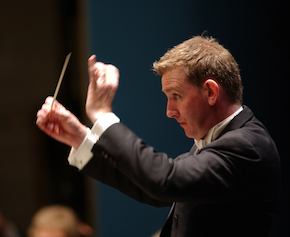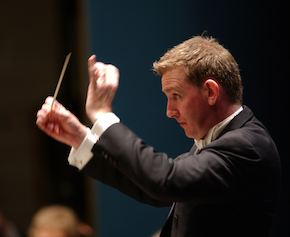
Nobody anticipated that tragic developments on the world stage could hit so close to home that they would lend the latest concert by the Marin Symphony, titled “Remembrance and Renewal,” emotional significance beyond the two works on the program: Anna Clyne’s Within Her Arms and A German Requiem by Johannes Brahms.
Both compositions are meditations on life and death, inspired by the deaths of the composers’ mothers. But the concert was also dedicated to the memory of John Christopher Stevens, U.S. Ambassador to Libya, who died in an attack on the U.S. Consulate in Benghazi, last September. Stevens is the son of Mary Commanday, who played the cello in the Marin Symphony for over 30 years, and who is married to Robert Commanday, founder of San Francisco Classical Voice.
What Clyne and Brahms also have in common is that, with their compositions, they focus on the mourners — the ones left behind by the dead — and they offer them consolation and acceptance.
British composer Anna Clyne (b. 1980) wrote an entirely instrumental piece for a small string ensemble of 15 players (three each of first and second violins, viola, cello, and bass). In her score, she includes a long quote from a Vietnamese Zen Buddhist monk, Thích Nhât Hanh, which concludes with the assurance that “The message of love and understanding has indeed come.”
Within Her Arms starts with a vulnerable three-note, violin motif that repeats and expands and spreads across the violins, until the lower strings attempt a kind of countermelody. The original motif returns but doesn’t really develop into much more than color and atmosphere until, at some point, the musical texture reaches a density that is somewhat reminiscent of Samuel Barber’s Adagio for Strings.
Clyne and Brahms … focus on the mourners — the ones left behind by the dead — and offer them consolation and acceptance.
The 15 string players of the Marin Symphony created a strangely compelling but slightly unsettling performance of Clyne’s minimalist piece. My appreciation of it, however, grew with repeated listening (to a different version via YouTube), and I definitely look forward to hearing it again.
Majestic, Agnostic Brahms
As a musical composition, Ein deutsches Requiem is everything that Clyne’s piece is not. Written for large orchestra, soprano and baritone soloists, and mixed chorus, and conceived in seven movements, it is Brahms’ largest vocal work and the central work of his career. Here, the composer demonstrates that he is firmly rooted in the German tradition of Bach and Beethoven, applying classical structural elements and using no fewer than three majestic fugues.
Coming from a Lutheran background, Brahms (who was an agnostic) made his own selection of texts from Luther’s translation of the Bible, taking excerpts from both Old and New Testaments and from the Apocrypha to create a nondenominational “German” Requiem — meaning a requiem in German, rather than in Latin.
Alasdair Neale kept the Chorus in perfect balance with the orchestra, from which he elicited a beautiful and rich, very German sound.
Brahms avoided any specific mention of Christ or even the notion of redemption and eternal rest for the dead. Instead, he focused on human sentiments around the death of a loved one; Brahms clearly wanted his Requiem to be a consolation for the living, and opened with a text from the Beatitudes: “Blessed are those who mourn, for they shall be comforted.”
Blessed were also the audience members at the Sunday afternoon concert that I attended.
The Marin Symphony Chorus, expertly prepared by Stephen McKersie, was a little hesitant in the softer passages of the Requiem, and their treatment of the German text would benefit from a higher degree of synchronization of t, ts, and sh sounds, in words like “Gott,” “Seufzen,” and “Menschen,” but on the whole the 100-member Chorus sounded quite homogenous, together, clear, and on pitch — and was never better than in fortissimo passages such as the climax of the fugue that crowns the second movement.
Music Director Alasdair Neale kept the Chorus in perfect balance with the orchestra, from which he elicited a beautiful and rich, very German sound with jammy strings and resonant winds. The woodwinds sounded particularly luscious.
Baritone Ao Li, a third-year Adler Fellow with the San Francisco Opera, made a robust and radiant soloist with a heroic timbre in the third and sixth movements of the Requiem, while soprano Marina Harris, a second-year Adler Fellow, sang her fifth movement solo, “Ihr habt nun Traurigkeit,” with velvety conviction, her melody gently rising from the creamy chords in the orchestra.
Neale demonstrated his spellbinding leadership even after the Requiem had ended, by holding everyone’s attention (and breath) during a few magnificent moments of concentrated silence before the well-deserved ovation erupted.

